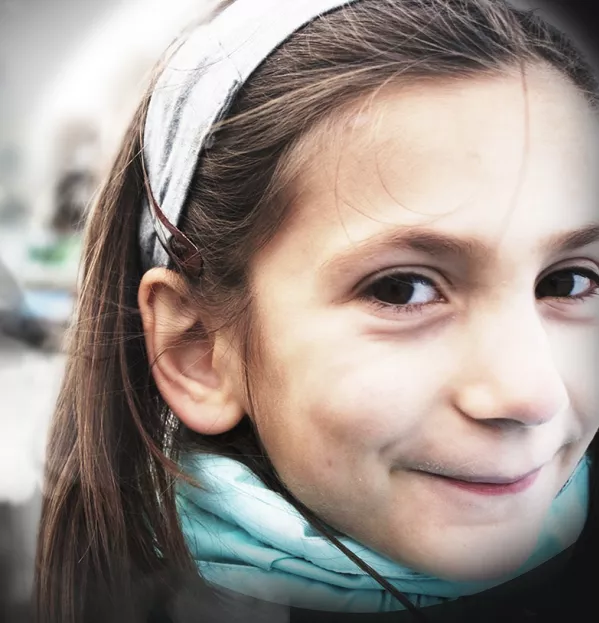Frankie Thomas: The tragic pupil death all schools must learn from

Frankie Thomas was, in the words of her mother Judy, a “real live wire”. She played bass guitar, was a keen climber, loved fast rides at theme parks, wore cool earrings and rocked a wild haircut.
She was also kind, charitable and caring - volunteering at a local charity that worked with children with disabilities - and had a fantastic sense of humour. “She performed at a school talent show, telling jokes, and she brought the house down,” recalls Judy.
Very sadly, though, in September 2018, aged just 15, Frankie died by suicide.
What emerged in the aftermath of the coroner’s inquest was that Frankie had been accessing inappropriate material online while at school on both a school-issued laptop and iPad.
Furthermore, she had been reading numerous stories that contained detailed descriptions of suicide and self-harm on a website where people can submit their own short stories - a site used in some schools. The last story she read detailed the method she used to take her own life that afternoon.
- Online safety: How schools can tackle post-pandemic concerns
- Safeguarding: Keeping Children Safe in Education - the new updates
- SEND: How to teach online safety inclusively
Given that Frankie was diagnosed as autistic and attended a special school, these revelations were deeply disturbing for Judy and Frankie’s father, Andy.
“It didn’t even occur to me that she might not be safe at school,” says Judy. “It never entered my mind.”
At home Frankie’s internet use was tightly controlled - devices had strong passwords and her parents sat with her when she accessed the internet.
Yet at school she had almost free rein to use the school iPads and her school laptop, often without any oversight from staff. What was even worse, though, was that an e-safety filtering system installed on the school laptops that was supposed to block sites and alert staff to students searching for harmful material was not working - and hadn’t been for months.
This meant no one knew what Frankie was searching for, watching and reading - with tragic consequences.
‘Fundamental failure’ in the case of Frankie Thomas
These revelations came to light during various coroner’s hearings, during which it also emerged that even after Frankie’s death, the school in question - at the time called Stepping Stones but now operating as Undershaw Education Trust - had still not fixed the broken filter system.
“Over a year later, iPads still weren’t being put through the filter…a year after someone died,” says Judy with shock.
Given all of this, the coroner’s report took the school, in Hindhead, Surrey, to task for many of the failings that were uncovered in the aftermath of Frankie’s death.
“No proactive steps were taken by the school to ensure the system was working effectively and or steps taken to ensure it was being adequately monitored,” wrote assistant coroner Karen Henderson in October 2021.
“I am satisfied that this was a fundamental failure in the duty of the school to ensure e-security.”
“It didn’t even occur to me that she might not be safe at school”
A spokesperson for Undershaw Education Trust says it has taken this feedback on board and updated its process and policies accordingly.
“Our entire school community have been devastated by the tragic death of Frankie Thomas,” it says in a statement.
“We have been proactive in implementing new and highly robust e-safety measures to ensure the welfare and safety of all our pupils. Our school leadership team monitors these structures regularly.”
However, it was not just the school that was criticised.

The coroner also said the policies in place for schools to follow around filtering systems were not good enough, and issued a Prevention of Future Deaths report to the education secretary at the time, Nadhim Zahawi, urging work in this area to be improved.
“The guidelines issued by the Department of Education require updating and are insufficiently robust to ensure their effectiveness and meet the changing demands of internet e-security in schools,” Dr Henderson wrote in November 2021.
“In summary, on the evidence I heard, there appears to be inadequate regulatory oversight with now outdated guidance issued by the Department of Education with regard to robust standards of e-security systems within schools.”
Questions about e-safety systems in schools
In light of everything they have been through since the death of Frankie, Judy says this was a major development and one she and her husband welcomed as part of their efforts to raise awareness about what happened and stop it happening at any other school.
“The coroner was great and her conclusion was more than we could have hoped for really…we were absolutely lost for words,” she says.
Zahawi replied to the coroner in January of this year, acknowledging the concerns raised, but said the appropriateness of any filter was “a matter for individual schools” because the needs of each setting would be different - so mandating a specific filtering set-up would be unworkable. While Judy understands that schools can choose their own e-safety equipment, she says they should nevertheless all regularly check it’s actually working.
Zahawi did note that a consultation on changes to the Keeping Children Safe in Education (KCSIE) policy document was seeking more information in this area and would include a question on filters.
That question was: “Do you feel able to make informed decisions on which filtering and monitoring systems your school or college should use?”
Most respondents said they did - 47 per cent - although 11 per cent said they did not.
In response to this consultation - and perhaps also because of the concerns raised by the Thomas family - the updated version of KCSIE that went live on 1 September now makes it more explicit that schools should review their filter systems and be aware of how they work - with the new text additions highlighted below in bold.
“Governing bodies and proprietors should ensure their school or college has appropriate filters and monitoring systems in place and regularly review their effectiveness,” the new guidance states.
“They should ensure that the leadership team and relevant staff have an awareness and understanding of the provisions in place and manage them effectively and know how to escalate concerns when identified.”
Demands for tougher regulation
Judy says she and her husband welcome these additions - noting that they do give schools a clearer sense of what they should be doing to ensure that systems are working. However, she worries that the guidance still lacks sufficient detail.
“The school [Stepping Stones] had ‘appropriate filters and monitoring systems in place’ which were not connected properly, so [saying schools] should ‘regularly review their effectiveness’ is helpful - but far too vague,” she says.
Her concern is that without specific detail on how often the system should be checked and without a requirement to ensure that these checks are recorded and subject to scrutiny by Ofsted, there is still the possibility that a school will believe it has the right systems in place but fail to adequately monitor them.
This was a point she made in her own response to the KCSIE consultation. “The school [Stepping Stones] thought they were following all your [DfE’s] good guidance - but a pupil still died,” she wrote.
“Saying schools should ‘regularly review their effectiveness’ is helpful - but far too vague”
This is why she wants a much clearer policy that says schools “must” ensure that they have systems in place that are working correctly, and she says that this should be checked in Ofsted inspections to ensure that schools are always on top of this area of pupil safety.
“A change in policy would be that, for instance, you need to show you are keeping records of the filter alerts, which should go to several members of staff who are then quickly following them up with the pupil, and Ofsted will be asking to see those […] just as they check records regarding fire safety checks being regularly carried out,” explains Judy.
This would mean that a lack of daily alerts would be a red flag that the filter is not working properly and prompt staff to investigate.
In pushing for these changes, the Thomases have been supported by their local MP, former education secretary Michael Gove, as well as receiving helpful guidance from the director of the UK Safer Internet Centre, David Wright.
Ofsted ‘not best placed’ to check
However, even with such backing and access to the corridors of power, the Thomases have been unable to meet with the education secretary, despite ongoing attempts to do so. Their calls for greater clarity on the frameworks governing e-filtering systems haven’t made the sort of progress with the DfE or Ofsted they wish to see.
For example, in a letter from Ofsted to the Thomases, Matthew Coffey, chief operating officer of the inspectorate, said it would not seek to ask inspectors to look at tests of filtering or monitoring systems.
“In your email, you ask if we will be asking inspectors to physically test firewalls on inspection and request proof of daily e-safety alerts from senior leaders at schools. I am afraid that we do not currently have any plans to do this,” he wrote in a letter sent on 25 July, which the Thomases shared with Tes.

Tes asked Ofsted for more information on this decision and a spokesperson said its newly updated safeguarding inspection guidance did contain information that “make[s] it clear that inspectors should consider whether leaders are doing all they reasonably can to protect children from online harm”.
However, it argued that including proactive tests to ensure that systems are working during inspections was not something it had the capacity to do.
“Given the relative infrequency of inspections, Ofsted is not best placed to ensure that e-safety systems are working with the regularity that is needed to protect children.”
Judy finds this stance strange. ”If schools knew Ofsted were going to check their record keeping regarding e-safety during inspections, this would surely influence a school to ensure they check their filtering/monitoring alerts daily and record this with the resulting follow-up action taken,” she says.
Meanwhile, a DfE spokesperson told Tes that the changes to KCSIE should make it clear to schools their responsibilities in this area and help to keep schools safe.
“Schools have a legal duty to keep their pupils safe and our statutory safeguarding guidance sets out in detail how we expect them to protect pupils from potentially harmful online material, including through making sure their settings have appropriate filtering and monitoring systems in place,” they said.
Safeguarding concerns
For Judy and Andy, though, the lack of specific legal requirements on how often systems are checked leaves them concerned that a similar tragedy could occur elsewhere.
“Imagine you’re a parent of a vulnerable child and you’re considering two or three different schools …if you knew what we know now about e-safety then how would you know that your child is going to be safe at a potential school - or are they actually going to find it really easy to go online and look at harmful material?” says Andy.
“How can you tell whether a school really is on top of the whole thing or not? Unfortunately, most of the time parents haven’t got a clue. Or even if they had got a clue, they can’t easily find out that information about any potential school.”
Judy says the situation also makes her question the value of an Ofsted rating when it comes to safeguarding and keeping children safe.
This is an understandable view when you consider that Stepping Stones received a “good” Ofsted rating in 2016, and a positive outcome from a 2018 inspection report shortly before Frankie died. It then also received a “good” rating again in 2019 - a year after Frankie died and with no reference to her death at all.
“How can you tell whether a school really is on top of the whole thing or not?’
“Ofsted’s reports were terribly, terribly wrong…from both their visits, just before Frankie died and a year later, they were saying supervision was good and e-safeguarding was good, but they didn’t even realise during either inspection that the filter wasn’t connected,” says Judy. “We want to challenge them and say, ‘That’s so wrong because if you had checked these things it might have changed everything.’”
“Neither did they realise, when they inspected the school in 2019, that Frankie had died and [Stepping Stones] got a ‘good’ rating,” she adds.
Judy says that this may have been because the school did not tell its inspectors about the situation. “I am so appalled the school seemingly did not tell Ofsted. They were just wanting to smooth over it all as though nothing had happened,” she says.
Undershaw Education Trust declined to comment on this.
The need for transparency
Notably, though, Ofsted has recently updated its code of conduct for inspections to include a new addition in the ”Expectation for providers” section, which says schools should provide all relevant information to an inspector.
“[Providers should] approach the inspection or regulatory activity with integrity and be open, transparent and honest,” it states.
“This includes providing evidence - or access to evidence - that will enable the inspector to report honestly, fairly and reliably about their provision. It means not withholding or concealing evidence, or providing false, misleading, inaccurate or incomplete information.”
While this change was not overtly linked to Frankie’s death, it seems reasonable to assume that the tragedy will have influenced thinking in this area - and a spokesperson for Ofsted acknowledged that it had taken “very seriously” issues brought up by the case and this had led to major discussion on its policies.
“Over the last few months, senior leaders across Ofsted have spent time discussing the Thomas family’s concerns about the circumstances surrounding Frankie’s tragic death and have drawn upon the expertise of colleagues, including our safeguarding group, to consider what we can and should do,” a spokesperson said.
“As a result, we have updated our guidance for inspecting safeguarding, as well as our mandatory online safety training for inspectors, ahead of inspections resuming in September.”
The need to raise awareness
This new guidance echoes the changes to KCSIE by noting that inspectors must check that schools are doing “all that they reasonably can to limit children’s exposure to any risks from the school or college’s IT system” - including around filters.
“As part of this process, governing bodies and proprietors ensure that their school or college has appropriate filters and monitoring systems in place to protect children from potentially harmful content, and regularly review their effectiveness,” it says.
Judy welcomes this addition, too - but is still concerned, saying that anything short of placing a legal requirement on schools does not go far enough.
“Regulation is needed to ensure that schools check they are receiving alerts daily, as this would indicate whether their filter was actually connected,” she says.
This is why, despite the impact that their efforts have had in terms of changing government guidance, Judy and Andy felt compelled to share their story with Tes, in order to raise awareness and drive action among schools and multi-academy trust about the need to test systems.
“My sister is a teacher and she said we should speak to [Tes] because then we know it would be heard in schools and we thought that would be really helpful,” says Judy.
It’s a message that James Browning, the chief information officer at Academies Enterprise Trust, which has 57 schools, says the Thomases are right to raise with the sector because all too often the installation of systems is seen as “job done” but the reality is that “regular testing [of e-safety systems] is critical” to ensure they are working as required.
“It is fair to say that historically the focus would be weighted towards getting these systems in place as opposed to testing, but tragic cases such as Frankie’s go to remind us that these systems are only effective when well implemented and managed,“ he says.
Browning says school leaders must ensure that regular testing is part of their standard operating procedures.
“Much as you would expect to test other critical systems such as fire alarms and security systems, regular testing helps to ensure that safeguarding systems are fit for purpose before an incident occurs,” he adds.
“Tragic cases such as Frankie’s go to remind us that these systems are only effective when well implemented”
Judy says the family hope this sentiment is heard and repeated in meetings in schools across the country, and this helps to prevent any family suffering as they have. “Frankie’s death has demonstrated there cannot be any vagueness around this - it has been proved to be deadly,” she says.
It would give them some solace to know that Frankie’s death has helped to keep others safe and, in time, it would allow them to step away from their work raising awareness about the problem and move on with their lives, while remembering their daughter as the fun, thoughtful, caring and adventurous teenager she was.
“Frankie loved rollercoasters and I had to go on with her as her carer,” recalls Judy. “I was terrified at first, going backwards, forwards, upside down, all over the place, and I would shut my eyes as tight as I could.
“But then I thought, ‘Well, if she’s doing it, so can I.’ She was just so full of life and adventure.”
Dan Worth is senior editor at Tes
topics in this article



